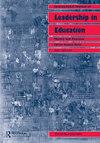Perceived gender barriers and recommendations for addressing gender inequality in academic leadership: a thematic analysis of MOOC discussion forums
IF 2.5
Q1 EDUCATION & EDUCATIONAL RESEARCH
International Journal of Leadership in Education
Pub Date : 2023-11-06
DOI:10.1080/13603124.2023.2274364
引用次数: 0
Abstract
ABSTRACTThere is ample evidence of the underrepresentation of women in academic leadership, especially in senior leadership roles. However, there is limited understanding of the barriers they face and the institutional measures that can promote gender equality. This study aims to fill this gap by exploring the perceptions and experiences of academic leaders of different genders and countries. Utilizing a qualitative research approach with a phenomenological design, we analyzed discussions from 75 academic leaders who participated in the LEAD2 MOOC forum on ‘Gender and Academic Leadership’. A thematic analysis of the discussion forum revealed socio-cultural barriers such as gender discrimination, organizational barriers rooted in male-dominated structures, and individual barriers such as work-life conflict. The study also highlights institutional policies and practices, such as unconscious bias training, transparent hiring and promotion criteria, and family-friendly measures, that can mitigate these barriers. The findings not only provide a comprehensive understanding of the challenges faced by women in academic leadership but also offer practical recommendations for policymakers and institutions. Finally, this study can serve as a foundation for future academic leadership development programs aimed at empowering female leaders. Disclosure statementNo potential conflict of interest was reported by the author(s).Additional informationFundingThis research received no specific grant from any funding agency in the public, commercial, or not-for-profit sectorsNotes on contributorsMarta LucchettiMarta Lucchetti is a Ph.D. candidate and working full-time on her Ph.D. research. Her research interests include educational leadership, educational innovation, educational technologies, and diversity and inclusion in higher education and the school context.Chang ZhuChang Zhu is a full professor in Educational Sciences at the Vrije Universiteit Brussel (VUB). She is the promoter and principal investigator of several key fundamental research projects in the field of higher education, internationalization, university governance, academic leadership, digital competence, digital pedagogy, educational innovations, online and blended learning, MOOC, ICT-supported learning, and social inclusion in digital learning environments.Aysun CaliskanAysun Caliskan is a postdoctoral researcher in Educational Sciences at the Vrije Universiteit Brussel (VUB). Her research mainly focuses on academic leadership, university governance, organizational culture, and educational innovations.感知到的性别障碍和解决学术领导中性别不平等的建议:MOOC讨论论坛的专题分析
摘要有充分的证据表明,女性在学术领导中的代表性不足,尤其是在高级领导角色中。然而,人们对她们面临的障碍和能够促进两性平等的体制措施了解有限。本研究旨在通过探讨不同性别和国家的学术领袖的看法和经验来填补这一空白。利用现象学设计的定性研究方法,我们分析了参加LEAD2 MOOC“性别与学术领导力”论坛的75位学术领袖的讨论。对论坛的专题分析揭示了社会文化障碍,如性别歧视,植根于男性主导结构的组织障碍,以及个人障碍,如工作-生活冲突。该研究还强调了可以减轻这些障碍的制度政策和做法,例如无意识偏见培训、透明的招聘和晋升标准以及家庭友好措施。研究结果不仅全面了解了女性在学术领导中面临的挑战,而且为政策制定者和机构提供了切实可行的建议。最后,本研究可以作为未来学术领导力发展计划的基础,旨在赋予女性领导者权力。披露声明作者未报告潜在的利益冲突。本研究没有得到任何公共、商业或非营利部门资助机构的特别资助。作者简介:marta Lucchetti是一名博士候选人,全职从事博士研究。她的研究兴趣包括教育领导、教育创新、教育技术、高等教育和学校环境中的多样性和包容性。常竹,布鲁塞尔自由大学教育科学专业正教授。她是高等教育、国际化、大学治理、学术领导、数字能力、数字教学法、教育创新、在线和混合学习、MOOC、ict支持的学习以及数字学习环境中的社会包容等领域的几个关键基础研究项目的发起人和首席研究员。Aysun Caliskan是布鲁塞尔自由大学(VUB)教育科学博士后研究员。主要研究方向为学术领导、大学治理、组织文化和教育创新。
本文章由计算机程序翻译,如有差异,请以英文原文为准。
求助全文
约1分钟内获得全文
求助全文
来源期刊

International Journal of Leadership in Education
EDUCATION & EDUCATIONAL RESEARCH-
CiteScore
5.10
自引率
14.30%
发文量
65
期刊介绍:
International Journal of Leadership in Education: Theory & Practice is an international journal for the publication of theoretical and practical discussions of educational leadership. The Journal presents: •cutting-edge writing on educational leadership, including instructional supervision, curriculum and teaching development, staff development, educational administration and more; •an alternative voice: reports of alternative theoretical perspectives, alternative methodologies, and alternative experiences of leadership; •a broad definition of leadership, including teachers-as-leaders, shared governance, site-based decision making, and community-school collaborations.
 求助内容:
求助内容: 应助结果提醒方式:
应助结果提醒方式:


